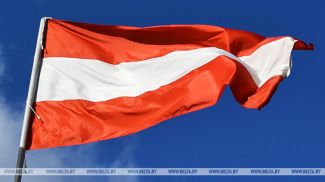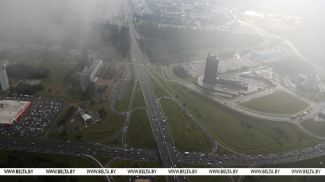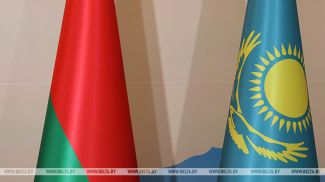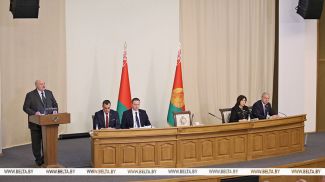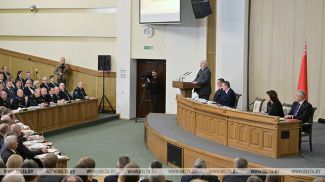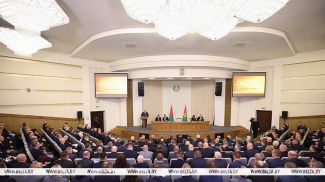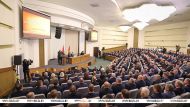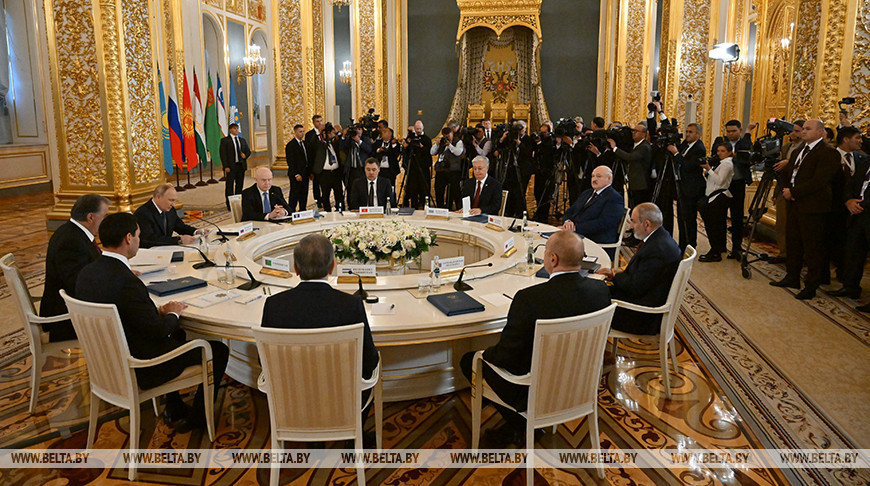
MOSCOW, 8 October (BelTA) – Belarusian President Aleksandr Lukashenko spoke of the strength of the historical unity of the CIS peoples at the CIS Heads of State Council summit in Moscow on 8 October, BelTA has learned.
The president called the mechanism of interaction within the CIS the most important tool for consolidating the political and economic strength of the CIS member states and the region in general. He stressed that there are many countries in the CIS that have the greatest potential: “These are rich countries. They are rich in resources that the whole planet needs very much today.”
“We stand on the shoulders of several generations, who managed to create a powerful state from scratch, which became one of the geopolitical centers of power. It was founded on the commonality of goals and respect for the traditions and cultures of our peoples. That is why it was strong. There are no analogues of the Soviet experience of nation-building in history,” the Belarusian leader said.
In this regard, Aleksandr Lukashenko said that nothing was surprising in the fact that a new unification of the now sovereign states is undesirable in the current geopolitical configuration. “We have always known this, so we have done everything to preserve such a unique model, and we have managed to do so,” he said. “The Soviet Union is long gone, but attempts to demonize the Soviet past do not stop in the West. They continue to fight the ghost there. What does it prove? This proves the strength of the historical unity of our peoples, which still worries both Washington and Brussels.”
In his speech Aleksandr Lukashenko said that the countries were together when they celebrated the Great Victory 80 years ago. Belarus supports the declaration of next year as the Year of the 80th anniversary of the Victory in the Great Patriotic War - the Year of Peace and Unity in the Fight against Nazism, which is once again becoming a threat to all mankind.
The president called historically fair the decision to establish the CIS honorary title “City of Labor Glory. 1941-1945”. “There would have been no Great Victory without the great sacrificial labor of the Soviet people in the rear,” the Belarusian leader said.
The president called the mechanism of interaction within the CIS the most important tool for consolidating the political and economic strength of the CIS member states and the region in general. He stressed that there are many countries in the CIS that have the greatest potential: “These are rich countries. They are rich in resources that the whole planet needs very much today.”
“We stand on the shoulders of several generations, who managed to create a powerful state from scratch, which became one of the geopolitical centers of power. It was founded on the commonality of goals and respect for the traditions and cultures of our peoples. That is why it was strong. There are no analogues of the Soviet experience of nation-building in history,” the Belarusian leader said.
In this regard, Aleksandr Lukashenko said that nothing was surprising in the fact that a new unification of the now sovereign states is undesirable in the current geopolitical configuration. “We have always known this, so we have done everything to preserve such a unique model, and we have managed to do so,” he said. “The Soviet Union is long gone, but attempts to demonize the Soviet past do not stop in the West. They continue to fight the ghost there. What does it prove? This proves the strength of the historical unity of our peoples, which still worries both Washington and Brussels.”
In his speech Aleksandr Lukashenko said that the countries were together when they celebrated the Great Victory 80 years ago. Belarus supports the declaration of next year as the Year of the 80th anniversary of the Victory in the Great Patriotic War - the Year of Peace and Unity in the Fight against Nazism, which is once again becoming a threat to all mankind.
The president called historically fair the decision to establish the CIS honorary title “City of Labor Glory. 1941-1945”. “There would have been no Great Victory without the great sacrificial labor of the Soviet people in the rear,” the Belarusian leader said.




